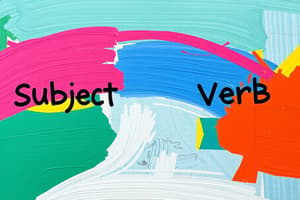Podcast
Questions and Answers
Which punctuation mark is used to provide a stronger separation between two closely related independent clauses?
Which punctuation mark is used to provide a stronger separation between two closely related independent clauses?
- Hyphen
- Semicolon (correct)
- Period
- Comma
In subject-verb agreement, what type of verbs do plural subjects require?
In subject-verb agreement, what type of verbs do plural subjects require?
- Present tense verbs
- Past tense verbs
- Singular verbs
- Plural verbs (correct)
What punctuation mark is used to indicate the end of a sentence?
What punctuation mark is used to indicate the end of a sentence?
- Period (correct)
- Exclamation mark
- Comma
- Semicolon
Which of the following is an example of a singular subject requiring a singular verb for subject-verb agreement?
Which of the following is an example of a singular subject requiring a singular verb for subject-verb agreement?
What type of sentence includes one independent clause and one dependent clause?
What type of sentence includes one independent clause and one dependent clause?
What is a recommended method to improve grammar skills, according to the text?
What is a recommended method to improve grammar skills, according to the text?
What does a compound-complex sentence combine?
What does a compound-complex sentence combine?
Which resource is suggested for catching errors and improving writing?
Which resource is suggested for catching errors and improving writing?
Study Notes
Mastering Grammar: Exploring Punctuation, Subject-Verb Agreement, and Sentence Structure
Grammar, the foundation of clear and effective communication in writing, is a vital skill that encompasses various elements. In this comprehensive article, we'll focus on three subtopics: punctuation, subject-verb agreement, and sentence structure, which are essential for writing well-constructed sentences.
Punctuation
Punctuation plays a critical role in clarifying the meaning of sentences by indicating breaks, pauses, or emphasis. The primary punctuation marks we'll discuss here are periods, commas, and semicolons.
- Periods (.): A full stop indicates the end of a sentence. It's essential to use a single space after a period.
- Commas (,): Used to separate items in a list or to indicate a pause in a sentence, commas clarify meaning and help prevent confusion.
- Semicolons (;): Semicolons provide a stronger separation between two closely related independent clauses. They demonstrate a closer connection between ideas than a period or a comma.
Subject-Verb Agreement
Subject-verb agreement is crucial to maintaining the consistency of a sentence. The subject and verb must agree in number (singular or plural). For instance, "The dog runs" is correct, while "The dogs runs" is incorrect.
- Singular subjects require singular verbs (e.g., dog, cat, etc.).
- Plural subjects require plural verbs (e.g., dogs, cats, etc.).
Sentence Structure
Sentences come in various forms, and understanding the different structures can help writers convey their ideas more effectively.
- Simple sentences consist of one independent clause that expresses a complete thought.
- Compound sentences combine two or more independent clauses using conjunctions like "and," "but," "or," etc.
- Complex sentences include one independent clause and one dependent clause (starting with subordinating conjunctions like "although," "because," etc.).
- Compound-complex sentences combine independent and dependent clauses, creating a more intricate structure.
Practice Tips
To improve your grammar skills:
- Read widely to increase your exposure to different types of sentences, punctuation, and subject-verb agreement.
- Engage in peer review, critiquing others' writing to identify errors and learn from each other's feedback.
- Utilize online writing resources, such as Grammarly or Hemingway Editor, to catch errors and improve your writing.
- Participate in writing workshops or join online writing communities to practice and refine your skills.
Conclusion
The importance of grammar cannot be overstated in written communication. By focusing on punctuation, subject-verb agreement, and sentence structure, you'll improve your writing and create more effective and engaging content. Happy writing!
Studying That Suits You
Use AI to generate personalized quizzes and flashcards to suit your learning preferences.
Description
Enhance your grammar skills by delving into punctuation, subject-verb agreement, and sentence structure. Learn about the usage of periods, commas, semicolons, maintaining consistency in subject-verb agreement, and different sentence structures to convey ideas effectively.




